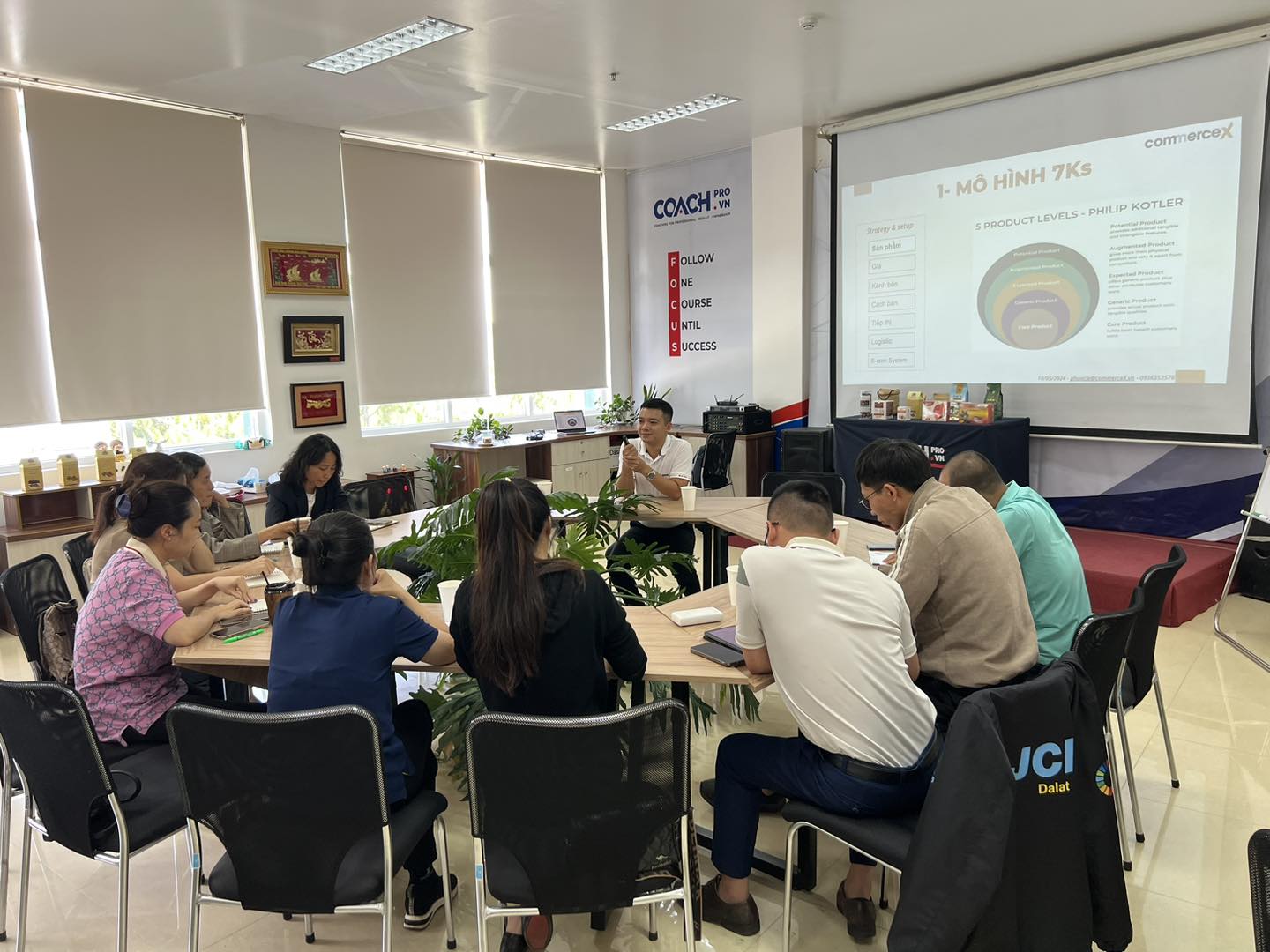Ngan's business, established in 2010, distributes and supplies home decor accessories, party decorations, and high-end gifts. After 10 years, the company faced difficulties, with declining in-person sales and increasing rental costs.
Amid these challenges, she decided to move her business online. Ngan spent 5-7 million Vietnamese dong on online sales courses, primarily focusing on livestreaming and product photography skills. More recently, with the rise of AI, she has explored tools to enhance customer reach.
After a year of adding online sales, her business began to thrive. In 2021-2022, revenue increased by 60% year-on-year. By 2023, this figure had risen to 80% compared to before the online channel was launched, effectively reviving the business.
Ngan's business is one of thousands of companies, cooperatives, and households in Vietnam that have found new growth opportunities through e-commerce. With its accessibility, online platforms help businesses, especially SMEs, expand their markets, increase revenue, and enhance competitiveness.
The Ministry of Industry and Trade's white paper recorded a nearly 50% growth in e-commerce in 2024 compared to 2022, reaching nearly 600,000 billion Vietnamese dong. Vietnam's e-commerce growth rate ranks among the top 10 globally. A 2023 survey by the Vietnam E-Commerce Association (VECOM) of 6,879 businesses found that approximately 65% sell on social media platforms like Facebook, Zalo, Instagram, and TikTok.
Besides businesses, individual households and farmers are also actively embracing online sales. The Vietnam Farmers' Union reported in 12/2023 that approximately 5.2 million farming households have opened online stores, with over 1.1 million generating revenue from selling agricultural products online.
In early July, Pham Van Thinh, Vice Chairman of the Bac Ninh Provincial People's Committee, and his colleagues sold over 54 tons of Luc Ngan lychees in just six hours during a livestream. This was part of the Luc Ngan Lychee Week and the province's digital transformation plan.
The Phu Xuyen Hanoi Craft Village fanpage, a local commercial information channel, regularly hosts livestreams selling Phu Xuyen specialties. Producers in renowned craft villages like Phu Yen leather shoes, Chuyen My inlaid mother-of-pearl, Dai Thang mechanics, and Dai Dong embroidery have seen their revenue increase 5-10 times compared to the same period last year thanks to online channels. Phu Xuyen's total e-commerce revenue in 2024 reached 1,010 billion Vietnamese dong, nearly seven times higher than in 2023. In the first five months of this year, e-commerce revenue reached over 4,000 billion Vietnamese dong.
The Bong Bach Tuyet brand has also been revived by expanding into e-commerce, particularly livestreaming. This strategy generated nearly 100 billion Vietnamese dong in e-commerce revenue for the company in 2024, accounting for one-third of the brand's total sales last year.
 |
A livestream training session at the former Hoang Long commune (now Phuong Duc commune - Hanoi). Photo: Phu Xuyen Hanoi Craft Village |
A livestream training session at the former Hoang Long commune (now Phuong Duc commune - Hanoi). Photo: Phu Xuyen Hanoi Craft Village
On TikTok Shop alone, the platform recorded 1.8 times growth in 2024 compared to 2023, opening up vast market access for sellers. TikTok Shop Mall, featuring nearly 2,400 brands and authorized distributors, achieved almost three times growth compared to 2023. In the first six months of 2025, this number continued to rise, with over 1,600 new authorized sellers joining.
Overcoming challenges in e-commerce
The potential of online platforms draws many SMEs into the game. However, this environment also presents challenges. Most business owners struggle with content creation, branding, and technology. Many are overwhelmed by livestream scripting, video production, or product photography. New concepts like running ads on social media or setting platform-specific pricing policies are also significant hurdles.
According to TikTok Shop, due to constantly evolving trends, sellers, businesses, KOLs, and KOCs must proactively expand their core competencies, continuously learn, and adapt to new technologies and sales techniques. Sellers also need to fulfill their obligations to state authorities and adhere to platform regulations.
 |
A livestream session on TikTok Shop. Photo: Provided by the interviewee |
A livestream session on TikTok Shop. Photo: Provided by the interviewee
Tuan Nguyen, Deputy CEO of commerceX, a digital commerce solutions provider, reported that over 165,000 sellers left the market in 2024 due to losses. Online businesses face various fees per order and intense competition from domestic and international rivals.
To address these challenges, businesses are seeking training from specialized institutions or e-commerce platforms themselves. Reports from the Ministry of Industry and Trade and related agencies indicate that tens of thousands of businesses, cooperatives, and households in Vietnam participate in e-commerce training programs annually.
On 17/7, the Ministry of Industry and Trade issued a decision on implementing domestic and international trade promotion tasks and solutions. The Department of E-commerce and Digital Economy will lead and collaborate with major e-commerce platforms and online businesses to implement regional and cross-border connection programs to boost online product consumption.
The Department of E-commerce and Digital Economy has organized numerous activities to promote e-commerce and digital transformation across localities. Conferences, training programs, and regional networking events have been implemented to enhance e-commerce development capabilities in provinces and cities.
The Center for E-commerce and Digital Technology Development (eComDX) is currently implementing specialized training programs to support businesses in applying technology to their operations. In the future, it will offer advanced courses focused on four pillars: GoOnline (enhancing digital presence); GoExport (connecting on cross-border platforms); GoAI (applying AI in marketing); and GoRight (updating legal systems).
 |
A commerceX e-commerce training session for small businesses in Da Lat. Photo: commerceX |
A commerceX e-commerce training session for small businesses in Da Lat. Photo: commerceX
E-commerce platforms are also strengthening cooperation and organizing programs to support local businesses, small traders, and individuals, aiming to promote Vietnamese goods. Nguyen Lam Thanh, a representative of TikTok Vietnam, stated that the platform is currently participating in the GoOnline program, collaborating on specialized training programs covering legal frameworks, tax regulations, and digital advertising solutions. The platform is also involved in supporting traditional market traders, aiming to equip 300,000 traders nationwide with e-commerce skills.
Beyond skills, Tuan Nguyen emphasizes the need for businesses to invest strategically, develop a unique identity, understand customer needs, conduct product R&D, and build sustainable brands.
Yen Chi












